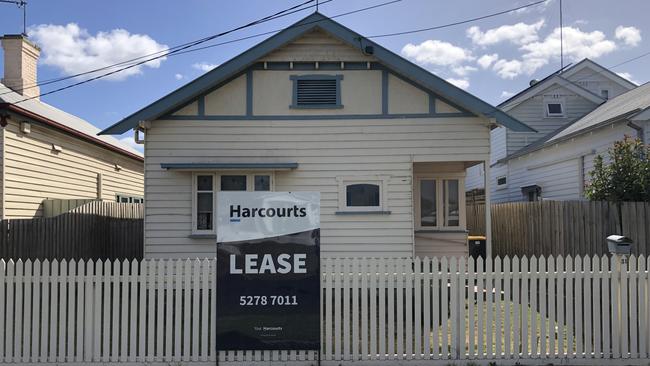Victorian renters to cop the brunt of new investment property tax hit
Victoria’s new tax hit on property investors is tipped to be the turning point for many mum-and-dad investors, with renters to feel the most pain long term. Here’s why.

Property
Don't miss out on the headlines from Property. Followed categories will be added to My News.
Renters are likely to be the unwitting victims of the Andrews government’s Covid Debt Levy, as changes to land tax raise costs for Victorians owning investment properties.
PropTrack executive manager of economic research Cameron Kusher said the policies had the potential to reduce rental stock even further at a time when the rental market desperately needs more properties.
Treasurer Tim Pallas announced Tuesday a $500 per year fixed charge for investment properties where the land component was worth $50,000 to $100,000; or $975 for land worth more than $100,000, on top of cutting the land tax-free threshold from $300,000 to $50,000.
Treasurer Tim Pallas said the new charges would be almost $1300 a year for investors that own an average parcel of land worth $650,000. The changes would last for 10 years.
RELATED: ‘Cool’ 90s South Yarra pad scores $220k bonus
Mould concerns rife in ‘horrible’ rental market
What your home could be worth in 2028: Every Vic suburb revealed
Mr Kusher said increasing land tax to investors was going to make investing in property less attractive at a time when the rental market needed more properties.
“We already know that. We’ve seen through Covid a lot of investors exit the market and we still seeing a high number exit.
“And this has the potential to encourage more investors to leave the market.
“At a time where you desperately need more rental stock, this policy does have the potential to reduce rental stock even further.”
Mr Kusher said while discounting capital gains tax and negative gearing made investing in property more attractive, owners also faced the highest interest rates in a decade, along with lower rental yields.
“But when you’ve got a rental crisis when we’re bringing in 1.5 million people over the next five years and we’re already struggling to house the people that are in the country, I don’t think it makes a lot of sense to make providing rental accommodation less attractive,” Mr Kusher said.

MORE: Thousands offered to boost land sale slump
Four-storey house has rooftop cinema, eight-car garage
Suburbs where homes sell in just 17 days
Property Council Victorian executive director Cath Evans said the levy would likely see more investors choose to sell up, ramping up pressure on rents in an already tight market.
“Most of the state’s rental stock is owned by mum-and-dad investors that lease their investment properties to Victorian renters,” Ms Evans said.
“Any owner of a rental property has significant outgoings in the form of insurances, council rates, repairs and maintenance to a property … body corporate fees are all part of the rich mix of outgoings for someone who owns a rental property.
“They’re under significant pressure already to hold those properties, so it may force a decision to sell those properties which then — given the shortage we have overall of housing stock — will be purchased by someone else, and then as a principal place of residence rather than rent.
“For those who are able to hang on to their property, they will have to pass that on to their tenant, which is a further increase in the cost of rent.”

The budget comes as PropTrack revealed the share of rental properties listed for less than $400 a week in Melbourne reached a record low 16.55 per cent in April – 30 per cent less than the same time last year, and vacancy rates remain at near-record lows.
The Victorian Council for Social Service has already warned that renters were not cash cows and it would be unfair and unjustified to pass on land tax increases to tenants.
Sign up to the Herald Sun Weekly Real Estate Update. Click here to get the latest Victorian property market news delivered direct to your inbox.
MORE: NAB predicts $200k+ plummet in Melbourne’s house price value by end of 2023
Melbourne’s affordable suburbs defying decline: Terry Ryder report
Big banks’ backflip on house price forecasts signals rebound



